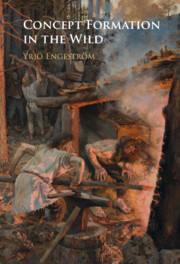Book contents
- Concept Formation in the Wild
- Concept Formation in the Wild
- Copyright page
- Dedication
- Contents
- Figures
- Tables
- Preface
- Chapter 1 Introduction
- Chapter 2 Theorizing Concept Formation in the Wild
- Chapter 3 Theorizing Concept Formation in the Wild
- Chapter 4 Functional Concepts in Organized Productive Activities
- Chapter 5 Embodied Germ Cell at Work
- Chapter 6 Double Stimulation and Concept Formation in Everyday Work
- Chapter 7 Collective Concept Formation as Creation at Work
- Chapter 8 Concept Formation over the Long Haul
- Chapter 9 Consequences of Concept Formation in the Wild
- References
- Index
Chapter 2 - Theorizing Concept Formation in the Wild
First Lessons
Published online by Cambridge University Press: aN Invalid Date NaN
- Concept Formation in the Wild
- Concept Formation in the Wild
- Copyright page
- Dedication
- Contents
- Figures
- Tables
- Preface
- Chapter 1 Introduction
- Chapter 2 Theorizing Concept Formation in the Wild
- Chapter 3 Theorizing Concept Formation in the Wild
- Chapter 4 Functional Concepts in Organized Productive Activities
- Chapter 5 Embodied Germ Cell at Work
- Chapter 6 Double Stimulation and Concept Formation in Everyday Work
- Chapter 7 Collective Concept Formation as Creation at Work
- Chapter 8 Concept Formation over the Long Haul
- Chapter 9 Consequences of Concept Formation in the Wild
- References
- Index
Summary
Four approaches to concept formation are particularly fruitful for the endeavor of this book. These are Adrian Cussins’ theory of cognitive trails, Serge Moscovici’s and Ivana Marková’s closely interconnected theories of social representations and dialogicality, Ed Hutchins’ theory of conceptual blending by material anchors, and Nancy Nersessian’s theory of model-based reasoning. An examination of these approaches yields the following initial lessons: (1) longitudinal character of concept formation, (2) materiality of concept formation, (3) societal and dialogical embeddedness of concept formation, (4) centrality of tensions and contradictions in concept formation, and (5) importance of change and future-orientation in concept formation in the wild. These first lessons are still embryonic. They draw on cognitive and social-psychological approaches that are not systematically built on materialist dialectics.
Keywords
- Type
- Chapter
- Information
- Concept Formation in the Wild , pp. 8 - 14Publisher: Cambridge University PressPrint publication year: 2024



